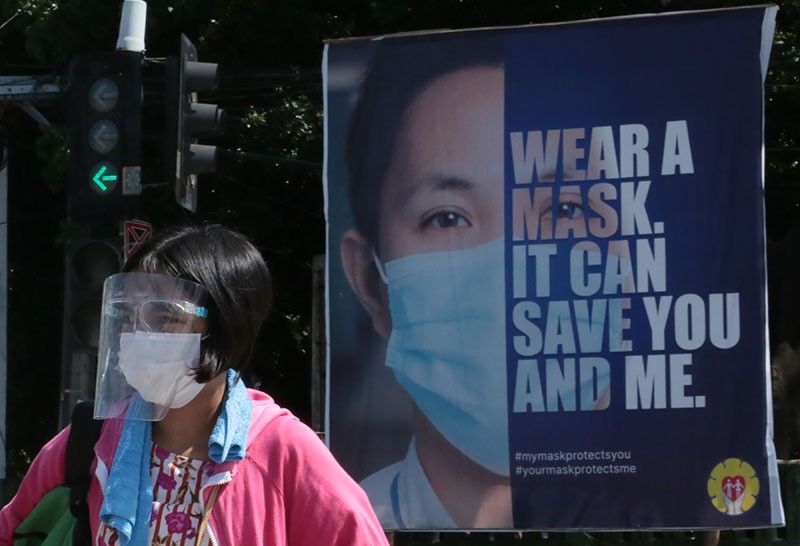Palace says a 'no-mask Christmas' is doable

MANILA, Philippines — An expert on Thursday urged the government and the public to work together to achieve a "no-mask Christmas," a goal that Malacañang said is attainable because of ongoing efforts to contain the pandemic.
University of Santo Tomas biological sciences professor and OCTA Research fellow Fr. Nicanor Austriaco said the Philippines needs 33 million doses of COVID-19 vaccines to contain the virus and 52 million doses to achieve herd immunity.
He explained that if herd immunity is achieved in the National Capital Region (NCR) plus eight - a collective term for Metro Manila, Bulacan, Batangas, Cavite, Laguna, Pampanga, Rizal, Metro Cebu and Metro Davao - the rest of the country would be protected because surges always begin in Metro Manila.
"So how long will it take? We calculated: If 250,000 (vaccine doses administered) per day, we will get to containment in October and herd immunity in November. And this is a realistic and attainable goal for all of us. So we have to imagine as a country a no-mask Christmas," Austriaco said at a press briefing.
"Can we have a no-mask Christmas? What would it look like? It would look like what it was before... When that happens, we can begin to lift social distancing and masking arrangements... This is something that we can imagine. Let us all do this together, where we achieve herd immunity – the NCR plus eight by Christmas and the rest of the country, by sometime next year," he added.
Austriaco said COVID-19 containment would protect the country against future surges, and allow the further reopening of the economy and the maskless gatherings of vaccinated persons. Outbreaks may still happen during containment but the virus would struggle to spread widely through the population, he added. Herd immunity, meanwhile, will protect the unvaccinated from the virus, starve the virus, and allow a return to the old normal.
To achieve containment, about 45% of the population of NCR plus eight or about 16.65 million people should be inoculated, a goal that requires 33.5 million vaccine doses, Austriaco said. Herd immunity, meanwhile, requires the vaccination of at least 70% of the population of NCR plus eight or about 25.9 million, a threshold that requires 51.8 million doses of pandemic jabs. Austriaco said the Philippines needs to achieve at least a containment to have a maskless Christmas.
"We have the capacity as long as we have the supply," Austriaco said.
Presidential spokesman Harry Roque expressed confidence that a no-mask Christmas is attainable.
"We can achieve it. That's why we are aiming for population protection or the containment discussed by Fr. Austriaco because we know that countries that achieved containment no longer require the wearing of masks outdoors like Israel and some parts of America. So that is what we are aiming for," Roque said in Filipino.
Roque said a total of 14,205,870 doses of COVID-19 vaccines have arrived in the Philippines as of June 17. More than 5.5 million Filipinos have received at least one dose of pandemic shot while more than two million have been fully vaccinated as of June 16.
'COVID surge to destroy Christmas'
Austriaco said measures should be undertaken to protect the population from new and more infectious COVID-19 variants.
He said the government should enforce a ten-day hotel quarantine for international travelers arriving in Metro Manila and Cebu. Austriaco said based on studies, the ten-day quarantine is 99.7% effective at preventing variants from entering a country.
"There is no scientific evidence that a seven-day quarantine would protect us enough from the Indian variant. And if it enters Cebu, it will enter the entire country and it will be catastrophic because we will get another surge and it would destroy Christmas this year," he said
"So my point is, let us not just follow India; let us not allow the Indian variant to enter the Philippines; let us follow the science. So instead of shortening the ten-day quarantine, we should seek ways to verify the vaccine status for returning Filipinos."
Austriaco said a ten-day quarantine can be expensive and difficult but it has to be done to protect the country against the Indian variant.
"And so, now we have to ask, are there ways to allow vaccinated Filipinos to bypass testing and quarantine?...We can always consider the IATF (Inter-Agency Task Force for the Management of Emerging Infectious Disease) travel pass that will be released either this week or next week around the world for precisely this question," he added.
Asked if he thought the government should reprioritize its vaccine allocations because of the rising number of infections in areas outside Metro Manila, Austriaco said pandemic shots are not used to deal with a current surge.
"Vaccines are used to prevent a future surge. And the reason why, is that vaccines take six weeks to two months to take effect. So if you are going through a current surge at the moment and you start vaccinating people, there will not be an effect on that surge for two months," Austriaco said.
Asutriaco noted that the Philippines' exit strategy is to prioritize NCR plus 8 in the vaccination program.
"And our hope and prayer, of course, is that a local government will be able to control a surge before that period. So, our exit strategy is a good exit strategy, it is a strategy that will hopefully give us a no-mask Christmas at least in the largest urban areas of our country," he added.
- Latest
- Trending



























